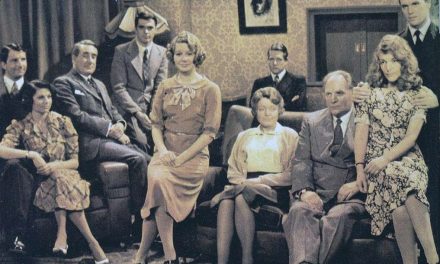When Canadian period crime drama Murdoch Mysteries (CityTV 2008-2012; CBC 2013-present, hereafter MM) was acquired by Canadian broadcaster par excellence CBC, one of the ways in which this acquisition was marked (and marketed) was by a crossover event with long-term CBC domestic product (and contemporary crime comedy-drama) Republic of Doyle (2010-2014, hereafter RoD). The airing of the RoD episode in 2014 also coincided with the 65th anniversary of Newfoundland, where RoD was shot and set, joining the rest of Canada in 1949. Following Edgerton (2020) I would argue that factual accuracy of either the 19th century or the twenty-teens in this context is less important than why this particular set of linked representations occurred at this particular time (i.e., both the industrial acquisition and the anniversary); as such I will be analysing representation (particularly analogy and metonymy) in that context.
For those unfamiliar with either series, MM is set in late 19th century Toronto, Ontario and follows Detective William Murdoch (Yannick Bisson) as he solves crimes using new and innovative techniques as well as a progressive sociocultural outlook. RoD is set in St John’s, Newfoundland, and follows ex-police officer turned private investigator Jake Doyle (Allan Hawco) who solves crimes with the technical and intellectual help of his extended family and displays of 70s-era-analogues of bravado (and a similarly 70s-era sociocultural outlook) from Jake himself. While there are many potential areas of critique for both series and one can analyse the crossover event in a variety of ways (e.g. cross-promotion of two strong/perceived-Canadian brands, enhancing quality with ‘event TV,’ et cetera), in this particular case I shall focus upon representation and the series’ colonial and postcolonial contexts.
To begin, one may ask exactly how a period drama and contemporary drama could cross over without help from a different genre. In this case, Hawco plays his RoD character’s ancestor Jacob Doyle on MM and Bisson plays his MM character’s descendent Bill Murdoch on RoD. This temporal boundary is one of the first to be crossed and negotiated; because of the ways in which period dramas negotiate temporal boundaries (e.g., representing an earlier time and/or place in a way which is intelligible for a contemporary audience) they are inherently liminal. Liminality, or being ‘in-between’ in Bhabba’s terms (1994:4), is a key aspect of postcolonial identities and that liminality as a space of negotiation is a key aspect of postcolonial detectives as they interrogate societies and/or cultures from internal and external perspectives (Christian 2001), something period dramas can also do. In this context, both series are postcolonial as MM not only represents Canada as a British colony but the characters move between Toronto and Newfoundland, at that time a separate British colony, and the collaboration between Murdoch and Jacob foreshadow the later confederation of Canada which Newfoundland joins in 1949. RoD is then postcolonial in that it represents contemporary Canada and Newfoundland (now former colonies) and the negotiations between national and regional postcolonial identities through Bill and Jake’s interactions.
Both Murdoch and Jake can be considered postcolonial detectives in these contexts as well as the fact that they are both liminal within their respective environments (Christian 2001). Murdoch is Catholic, which was uncommon in Toronto, especially with regard to its constabulary. Jake is a private detective, a common enough postcolonial detective trope (though commonly associated with American ‘hard-boiled’ detective fiction, Matzke and Mühleisen 2006), but not only is Newfoundland liminal in its geographical position it is also very different culturally to the rest of Canada. Though both Canada and Newfoundland were British colonies, Newfoundland has a long history of Irish immigration, who were primarily merchants (Mannion 1986). As Trew (2005) notes, Newfoundland’s historic and cultural connections with Ireland are present though contested and have also been intentionally engaged for economic gain, primarily with Ireland during its ‘Celtic Tiger’ economic period. This began with the ‘Memorandum of Understanding’ (MOU) signed in 1996 with the 2004 reaffirmation of the MOU focusing in part on culture and heritage in addition to industry (Lalor, 2009). This use of the ‘Irish lens’ in ‘the commodification of [Newfoundland] culture’ (Walsh 2008: 125) can be read as connecting to the promotion of difference, albeit a saleable and/or desireable one, co-opts the cultural capital of Newfoundland-as-distinct due to its perceived-Irish connections as opposed to or in tandem with the English/British connections of Canada as a postcolonial country (cf Jackson 2018 on Canadianness and Britishness as well as Beattie 2020 on Canada-as-distinct) and grants this distinction to MM just as the cultural capital of being a period drama with British links (i.e., Canada as a then-British colony with multiple British regular characters) is co-opted and granted to RoD (cf Weissmann 2012).
One of the key elements of both episodes is that Murdoch goes to Newfoundland as part of a case. Though Jake/Jacob and Murdoch/Bill initially distrust each other, they ultimately work together to solve a crime in their respective jurisdictions and time periods. Thus I would argue that this crossover in part serves to not just commemorate the 65th anniversary of Newfoundland joining Canada but also to make the point that both the regions and nation can exist, support and enrich each other when they work together. This is relevant for two main reasons. Guibernau (2006) found in a study on devolution that Canadian citizens showed strong, simultaneous regional and national identities which they did not generally see as being in conflict. That said, Striner (2017) notes that there is still a secessionist movement in Newfoundland. This promotion of unity (when there is an active secessionist movement) can be read by the fact of the CBC bringing together two metonyms for both region and nation under the same national broadcaster, as well as showcasing the associations of both series that are connected to postcolonial spaces of negotiation.
The other relevant point is that the crossover event shows cooperation and collaboration both past and present and explicitly notes that in the text: ‘Is it just me,’ Bill Murdoch asks in the final shot as he and Jake walk along the cliffs, ‘or does it feel like we’ve done this before?’ ‘I dunno,’ Jake Doyle replies. ‘Maybe it all happened in another life, hey b’y.’ This hanging of the lantern is not only a postmodern breaking of the fourth wall but also connects back to the past and implies a promising future. This is, in part, because of how MM plays with the temporal bounds of its text. The series is known for incorporating historical and literary figures into its text, often playfully acknowledging or prefiguring various events. This happens in the MM part of the crossover in which Murdoch, Jacob and Murdoch’s constable George Crabtree (Jonny Harris), who is also a Newfoundlander, somewhat randomly meet Guglielmo Marconi (Jason Card) who is trying to set up a radio transmitter on the cliff they are staking out. Jacob tells him to go to Signal Hill, implying that not only were they responsible for helping the development of mass media but also that the area was already called Signal Hill even before Marconi sent his signal. Because of Jacob’s presence in MM and then Bill’s presence in RoD, the characters are not only positioned as metonyms for their respective regions and of Canada, but they are given an historical or pseudo-historical status. This amplifies the metonymy to be sure but it also implies that the characters and their diegeses are part of Canada and Canadian history and culture.
What this illustrates is that there is a clear blend of aligned industrial and national impetus in this crossover event. As a national broadcaster, CBC is invested in both the acquisition and promotion of perceived-Canadian series as well as constructing and maintaining a Canadian national identity in its media representations. While I haven’t time to get into the complexities of that identity here (see Beattie 2020) one can read this as simultaneously supporting and valuing (through this promotion) both national and (a) regional identity/-ties in much the same way as Guibernau (2006) found. This type of working together is a form of regionalisation of content that, though imperfect as all representation must be, other national broadcasters might seek to emulate in future.
Dr Melissa Beattie is a recovering Classicist who was awarded a PhD in Theatre, Film and TV Studies from Aberystwyth University where she studied Torchwood and national identity through fan/audience research as well as textual analysis. She has published and presented several papers relating to transnational television, audience research and/or national identity. She is currently an Assistant Professor of Communication (Ambassador’s Distinguished Scholars Programme Fellow) at Bahir Dar University in Ethiopia and will be joining the American University of Phnom Penh in August 2023 as an Assistant Professor of English/Humanities. She has previously worked at universities in the US, Korea, Pakistan and Armenia. She can be contacted at tritogeneia@aol.com.
References
Beattie M (2020) ‘Like an American but without a gun’?: Canadian national identity and the Kids in the Hall. Participations 17(2): 3-24. https://participations.org/17-02-02-beattie.pdf
Bhabba H K (1994) The Location of Culture. London: Routledge
Christian E (2001) Introducing the post-colonial detective: Putting marginality to work. In Christian E (ed). The Post-Colonial Detective. Houndmills: Palgrave MacMillan, pp. 1-16.
Edgerton G R (2020) The past is now present onscreen: Television, history, and collective memory. In Wasko J and Meehan ER (eds). A Companion to Television 2nd Ed. Chichester: Wiley Blackwell, pp. 79-104.
Guibernau M (2006) National identity, devolution and secession in Canada, Britain and Spain. Nations and Nationalism 12(1): 51–76. https://doi.org/10.1111/j.1469-8129.2005.00230.x
Jackson S (2018) Constructing National Identity in Canadian and Australian Classrooms: The Crown of Education. Cham: Palgrave Macmillan.
Lalor J D (2009) Ethnicity, culture, and globalization: Exploring the Memorandum of Understanding between Newfoundland and Labrador and Ireland. Newfoundland Studies 24(1): 1–24. https://id.erudit.org/iderudit/nflds24_1art02
Mannion J (1986) Irish Merchants Abroad: The Newfoundland Experience, 1750-1850. Newfoundland Studies 2(2): 127–190. https://id.erudit.org/iderudit/nflds2_2art01
Matzke C and Mühleisen S (2006) Postcolonial postmortems: Issues and perspectives. In Matzke C and Mühleisen S (eds), Postcolonial Postmortems: Crime Fiction from a Transcultural Perspective. Amsterdam: Rodopi, pp. 1-16.
Striner R (2017) A Brief History of Secession. The American Scholar 86(2): 20–29. https://theamericanscholar.org/a-brief-history-of-secession/
Trew J D (2005) The Forgotten Irish? Contested sites and narratives of nation in Newfoundland. Ethnologies 27(2): 43–77. https://doi.org/10.7202/014041ar
Walsh K H (2008) Irish-Newfoundland step dancing and cultural identity in Newfoundland. Ethnologies 30(1): 125–140. https://doi.org/10.7202/018838ar
Weissmann E (2012) Transnational Television Drama: Special Relations and Mutual Influence Between the US and UK. Houndmills: Palgrave MacMillan.





